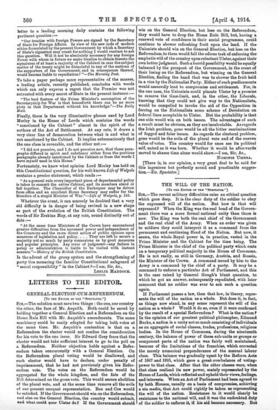LETTERS TO THE EDITOR.
GENE RAL-ELE CTION-CUM-REFEREND UM.
[TO THE EDITOR 07 THE SPECTATOR...1 SIR,—The solution must save two things : the one, our country the other, the face of Mr. Asquith. Both could be saved by holding together a General Election and a Referendum on the Home Rule Bill with Mr. Asquith's amendments. The same machinery could be easily adapted for taking both votes at the same time. Mr. Asquith's contention is that on a Referendum the elector would not confine the consideration for his vote to the one issue. Sir Edward Grey fears that the elector would not take sufficient interest to go to the poll on a Referendum. Neither objection holds against a Refer- endum taken concurrently with a General Election. On the Referendum plural voting would be disallowed, and each elector would have to declare, under penalty of imprisonment, that he had not previously given his Refer- endum vote. The votes on the Referendum would be aggregated for the whole kingdom, and the fate of the Bill determined on the gross vote. This would secure abolition of the plural vote, and at the same time remove all the evils of our present unequal representation. Box and Cox would be satisfied. If the Government should win on the Referendum, and also on the General Election, the country would submit, and what could poor Ulster do ? If the Government should win on the General Election, but lose on the Referendum, they would have to drop the Home Rule Bill, but, baying a renewed vote of confidence in their social programme, could continue to shower refreshing fruit upon the land. If the Unionists should win on the General Election, but lose on the Referendum, to them would fall the odious task of enforcing the emphatic will of the country upon reluctant Ulster, against their own better judgment. Such a horrid possibility would be equally balanced by the prospect of the Government, in the event of their losing on the Referendum, but winning on the General Election, finding the hand that was to shower the fruit held in a vice by the Nationalist Party. Either of such predicaments would assuredly lead to compromise and settlement. For, in the one case, the Unionists could placate -Ulster by a promise to remove the time-limit, and, in the other, the Liberals, knowing that they could not give way to the Nationalists, would be compelled to invoke the aid of the Opposition in forcing on the Nationalists some scheme of Devolution on federal lines acceptable to Ulster. But the probability is that one side would win on both issues. The advantages of such a result must be obvious, as they are incalculable. As regards the Irish problem, gone would be all the bitter recriminations of fogged and false issues. As regards the electoral problem, gone would be the evils of the plural vote and of the uneven value of votes. The country would for once see its political self, naked as it was born. Whether it would be afterwards moved to shame time alone would show.—I am, Sir, ke., NOXIITIS UMBRA.
[There is, in our opinion, a very great deal to be said for this ingenious but perfectly sound and practicable sugges. tion.—En. Spectator.]














































 Previous page
Previous page